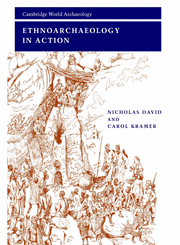Book contents
- Frontmatter
- Dedication
- Contents
- List of figures and credits
- List of tables
- Preface
- Acknowledgments
- Map
- 1 Ethnoarchaeology: its nature, origins, and history
- 2 Theorizing ethnoarchaeology and analogy
- 3 Fieldwork and ethics
- 4 Human residues: entering the archaeological context
- 5 Fauna and subsistence
- 6 Studying artifacts: functions, operating sequences, taxonomy
- 7 Style and the marking of boundaries: contrasting regional studies
- 8 Settlement: systems and patterns
- 9 Site structures and activities
- 10 Architecture
- 11 Specialist craft production and apprenticeship
- 12 Trade and exchange
- 13 Mortuary practices, status, ideology, and systems of thought
- 14 Conclusions: ethnoarchaeology in context
- Bibliography
- Index
11 - Specialist craft production and apprenticeship
Published online by Cambridge University Press: 05 March 2015
- Frontmatter
- Dedication
- Contents
- List of figures and credits
- List of tables
- Preface
- Acknowledgments
- Map
- 1 Ethnoarchaeology: its nature, origins, and history
- 2 Theorizing ethnoarchaeology and analogy
- 3 Fieldwork and ethics
- 4 Human residues: entering the archaeological context
- 5 Fauna and subsistence
- 6 Studying artifacts: functions, operating sequences, taxonomy
- 7 Style and the marking of boundaries: contrasting regional studies
- 8 Settlement: systems and patterns
- 9 Site structures and activities
- 10 Architecture
- 11 Specialist craft production and apprenticeship
- 12 Trade and exchange
- 13 Mortuary practices, status, ideology, and systems of thought
- 14 Conclusions: ethnoarchaeology in context
- Bibliography
- Index
Summary
Craft specialization has long been recognized by Marxists and non-Marxists as a factor of significant weight in the development of complex societies.
(Maurizio Tosi 1984: 22)As usual in archaeology, pottery provided the key …
(William Adams in Adams and Adams 1991: 101)After introducing the topic of craft specialization and presenting typologies of the phenomenon, we discuss learning of crafts and apprenticeship, focusing on research in India that combines ethnoarchaeology with cognitive psychology. Most of the ethnoarchaeological literature on craft specialization relates either to ceramics or to metallurgy. As ceramics are extensively treated elsewhere in this book, we here limit ourselves to citing a range of studies relating to forms of craft specialization in pottery manufacture. We then present two contrasting approaches to the analysis of agate beadmaking that have conflicting implications for the interpretation of Harappan archaeology. The larger part of the chapter relates to the ethnoarchaeology of metallurgy. Iron smelting in Africa is emphasized, but we also consider blacksmithing and brasscasting.
Specialist craft production
The rise of craft specialization has been tied to numerous factors, including ranking and power structures … the rise of urbanism … elite and/or ritual goods … restricted access to raw materials … trade and exchange systems … and elite control of markets and allocation of resources … It has often been tied directly to metallurgy …
- Type
- Chapter
- Information
- Ethnoarchaeology in Action , pp. 303 - 359Publisher: Cambridge University PressPrint publication year: 2001

